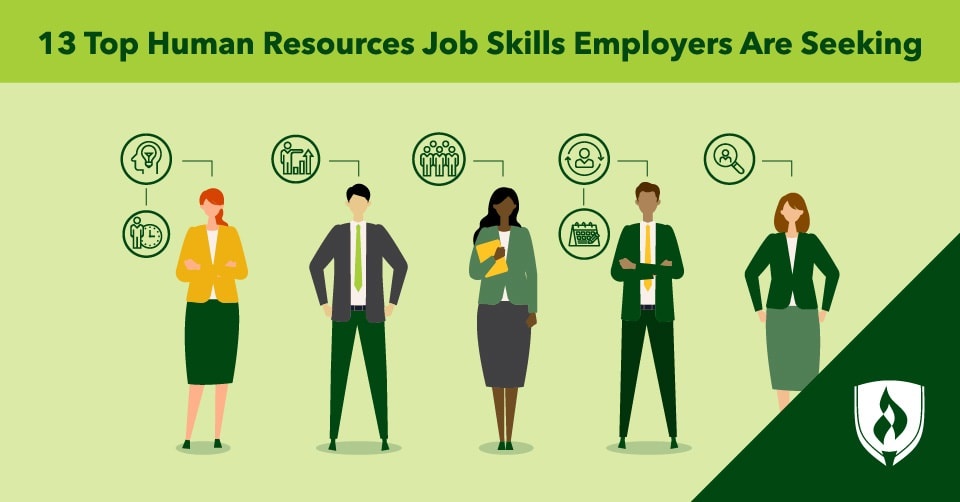
There’s a strange dynamic at play when applying for a position in human resources (HR). You sit on one side of the desk as an applicant, but—in many cases—if you land the job, you might just vault right over that desk into the hiring seat.
Pursuing an HR career is not for the faint of heart. Being a trusted consultant for managers making hiring and firing decisions, keeping watch over employee welfare and handling a company’s most sensitive information isn’t for everyone. You feel like you’re up for the challenge but want to know what exactly will be expected of you. This preparedness is especially important, given how well your potential interviewers may know the job—you’ve got to know your stuff.
We’re here to help you prepare and better understand what employers are seeking. To do this, we spoke to a few HR professionals and used real-time job analysis software to examine more than 140,000 human resources job postings from the past year.1 The data helped us identify the top thirteen skills employers are seeking in HR candidates.
Of course, a list of commonly sought-after skills and competencies for HR professionals is only a starting point for exploring the demands of a role. We’ll help by expanding on each—and what you can do to showcase these skills and abilities as a prospective HR hopeful.
13 In-demand human resources skills
- Employee relations
- Onboarding
- Human resources information software (HRIS)
- Performance management
- Teamwork and collaboration
- Scheduling
- Payroll processing
- Customer service
- Project management
- Worker's compensation
- Technological aptitude
- Family Medical Leave Act (FMLA)
As you consider your proficiency in each of the HR skills and competencies listed, think about how you could represent them in an interview and on your human resources resume.
Read on to get a more in-depth look!
1. Employee relations
Successful businesses thrive on secure employee–employer relationships and the professionals who support those connections. Being able to identify and resolve employee concerns as they develop creates a more satisfying work environment for employees and employers alike. This is a relatively broad area in the HR field—everything from labor disputes to managing employee benefits packages can be tied to it. Fundamentally, it comes down to your ability to manage conflict and be an advocate for both your employer and its employees.
How to highlight this in a job interview: Ask yourself if there was a time when you were involved in a discrepancy between two individuals in a professional setting. How did you work to resolve their differences in a respectful, empathetic and efficient way? Be specific. Which soft skills were important to use? How did you address concerns and determine an outcome? This is also an opportunity to highlight your knowledge of labor laws and the key regulations surrounding employer–employee disputes.
2. Onboarding
Employee turnover is expensive, and a strong onboarding process can help reduce it. Onboarding refers to the process that allows new hires to become adjusted to the social and performance aspects of their new job quickly and smoothly. Companies are looking to hire HR professionals who can comfortably bring new hires “onboard” with orderly and well-thought-out processes, increasing the chance that they will settle happily and successfully into their new jobs for the long run.
How to highlight this in a job interview: Share occasions where you helped someone feel at home or make a transition. Specific examples of taking initiative to prevent hard feelings and promote open communication between co-workers will speak well of your ability to thrive in an HR position.
3. Human Resources Information Software (HRIS)
Human resources information software are IT tools used for managing HR-related activities and processes electronically. There are a variety of specialized HRIS systems out there, but most have similar core functionality that helps automate some of the more tedious work HR staffers would tend to.
How to highlight this in a job interview: This admittedly can be a tricky requirement to fulfill if you haven’t previously worked in an HR role. If you have any experience working with an HRIS system, it’s clearly a good idea to mention what software you’ve worked with and how you used it.
If you lack experience with this software, then your best bet may be showcasing how you’ve learned to use other software and tying it to your eagerness to quickly learn. Most are fairly intuitive, so this likely won’t be a big sticking point for most employers.
4. Onboarding
Recruiting skilled and sought-after employees is an art form of its own. HR professionals need to understand their company deeply to be able to draw in solid, talented employees who will stick around. Recruiters are often their own specialized role, but talent acquisition is also a valuable skill for generalists as well.
How to highlight this in a job interview: There isn’t always an easy direct example to highlight if you’re new to the field, but anything that highlights your ability to listen well, negotiate, build relationships, keep organized and stay determined can be a nice starting point.
5. Performance management
Performance management is defined as how a company involves its employees in improving effectiveness towards the accomplishment of company goals, according to the U.S. Office of Personnel Management (OPM®). The OPM lists performance management tasks that fall under this umbrella as setting expectations for employees, monitoring performance, developing their capacity to perform and rating performance. This skill relies heavily on strong communication and interpersonal abilities and can help with long-term employee tenure trends.
“If you’re pursuing a career in HR, then you should have great listening skills, empathy and emotional intelligence,” says Sophie Lhoutellier, HR manager at Badger Maps®. “I wish more HR applicants would show great listening skills as well as proactivity. People tend to forget that they’re here to listen to the employees and their needs, and to do everything they can to make the company a better place to work at.”
How to highlight this in a job interview: Talk about any experience you have teaching, coaching, tutoring or mentoring someone else. Think of times when really listening to what someone was saying helped you solve a problem. Highlight these experiences on your resume and be prepared to discuss them in a way that shows you’re open, tolerant and versatile.
6. Teamwork and collaboration
“Because HR professionals are focused on finding and creating the best workplace possible, it is extremely important that we find collaborative team members who believe in our mission,” says Vicki Choi, director of HR at Course Hero. You might think that teamwork would be a given in a field like HR, but it’s in demand to the point of making the top-five skills on job postings.
This could reflect a mindset of HR professionals who look to the overall vision of the company instead of just the rules and tasks that make up their daily work. “I wish that more applicants would be oriented toward change and growth instead of just working with the existing HR processes,” Lhoutellier says.
How to highlight this in a job interview: Collaborating in HR often means working with professionals from many different departments, some of which might be outside of your personal wheelhouse. It’s important to know what you don’t know—and be willing to learn.
“Candidates who stand out during the interview process are able to show that they communicate honestly and are willing to be transparent about their successes, failures and progress,” Choi explains. “We have found that candidates who show these skills continue to create value for our HR team and the entire company.”
7. Scheduling
Employers want HR candidates with scheduling skills because many positions require juggling and prioritizing tasks on a team or company calendar. It’s important to be able to create a plan that allows everyone to achieve their goals.
How to highlight this in a job interview: Ask yourself if you have experience planning a multi-step project and how you had to strategically organize and prioritize time to complete each task along the way. This could have been for a wedding, school project or even a vacation overseas.
8. Payroll processing
Understanding how an organization’s payroll processing system works is important for many HR roles, particularly those that focus on employee benefits. For instance, if an employee elected to change their 401k contribution level and finds that change isn’t reflected in their paycheck, an HR specialist may be able to clarify and assist with addressing this issue. Compensation and benefits can get fairly complex, so having a solid understanding of payroll systems is a helpful asset.
How to highlight this in a job interview: When just starting out, this may be a challenge to highlight without prior experience. That said, knowing how payroll and HR interact and where their responsibilities overlap is the key if you’re asked about this subject.
9. Customer service
Human resources professionals need plenty of management and leadership ability to do their jobs. But customer service skills are a huge part of resolving workplace issues. HR professionals spend lots of time in conflict situations. According to Joe Campagna, owner of My Virtual HR Director, simply being a people person isn’t enough to field discipline, mediation and receiving complaints.
How to highlight this in a job interview: “I prioritize candidates who have experience in working with and helping people in some way,” says Lhoutellier. She offers examples such as volunteering, tutoring or coaching. “It shows that they have empathy, which is at the heart of any HR position. You can teach certain tasks of an HR role, but it’s much more difficult to teach soft skills like empathy and communication.”
10. Project management
“Apart from day-to-day administrative duties, HR is almost always in the midst of some large project,” says Campagna. “It can be writing a handbook, installing a performance management system or any other of a myriad of HR-driven projects from HRIS to employee surveys.”
How to highlight this in a job interview: If you’ve managed even a small project before—definitely include that information on your resume. If not, showcasing assertiveness, leadership and a great work ethic can be helpful for this skill. “HR isn’t the picnic department, it’s the productivity department,” Campagna says. “If HR cannot align managers to goals and ask the tough questions, then it is not worth having in a company.”
11. Worker's compensation
HR handles any incidents of work-related injuries or illnesses. Each company should have a plan of action and compensation for employees who are hurt on the job that is in accordance with state and federal laws. HR representatives need to understand the laws regarding worker’s compensation and how to help the employee and company navigate the compensation process.
How to highlight this in an interview: Since an injury incident can be fraught with tension, having strong communication and professionalism is vital in compensation conversations. If you haven’t had experience with worker’s compensation, try to showcase your ability to remain professional and compassionate in conflict.
“The most important soft skills in a professional HR specialist are conflict management and ethics,” says Eva Wislow, HR manager at Careers Booster. “Listening to others, resolving issues in a respectful and appropriate way, all while handling lots of sensitive information are the most common tasks for this role.”
12. Technological aptitude
Though technology-specific skills didn’t appear in the top-ten skills employers are asking for in their job postings, many of our experts shared that being tech-savvy gives you an edge on the market. This could be anything from data analysis to virtual reality adaptations in HR, according to Wislow.
“HR applicants need to have love for numbers and data, projections and analysis,” Wislow says. “Many HR professionals make all kinds of decisions without looking at the numbers—their job revolves around theories and politics.” Wislow adds that many job candidates get lost when data analysis and projection come into the conversation.
How to highlight this in a job interview: Courses or certifications in data analytics would be excellent things to include. Definitely read up on what is happening in the industry, as well as which technologies are enabling the trends. “New employees should be up-to-date on the latest HR trends,” Wislow says. “Big data, gamification, virtual reality in HR—it’s all already here.”
13. Family Medical Leave Act (FMLA)
The Family Medical Leave Act was passed in 1993, and it covers eligible employees for up to 12 weeks of unpaid, job-protected leave due to various family or medical situations. During your work in HR, knowledge of this law and its various components will be a key part of the job that you need to be aware of.
How to highlight this in a job interview: If you are currently unfamiliar with the FMLA, read up on it. Being able to refer to this law and some of its different uses for employees will only highlight to your interviewers that you know your stuff.
Are your HR job skills up to par?
As you can see, there is a lot more to human resources job skills than being good with people. If you could see yourself getting into some of these aptitudes, you might have what it takes to thrive in human resources. “Go into HR because you like to make order out of chaos,” Campagna says. “Go into HR because you like to impact people’s lives for good by influencing pay, benefit packages and employee-friendly policies.”
If you don’t quite feel you’ve mastered these skills enough to list them on your human resources resume, don’t be intimidated. This is precisely the knowledge and experience you’ll acquire in an HR degree program. Learn more about how you can develop your HR skills by checking out the Rasmussen University Human Resources and Organizational Leadership degree page. Curious about some HR roles? Check out everything you need to know about becoming a human resource specialist and "what I wish I knew before working as a recruiter."
1Burning-Glass.com (analysis of 211,391 human resources job postings, Jul. 01, 2021 - Jun. 30, 2022).
EDITOR’S NOTE: This article was originally published in July 2013. It has since been updated to reflect information relevant to 2022.
OPM is a registered trademark of the U.S. Office of Personnel Management.
Badger Maps is a registered trademark of Badger Maps, Inc.
Course Hero is a registered trademark of Course Hero, Inc.




